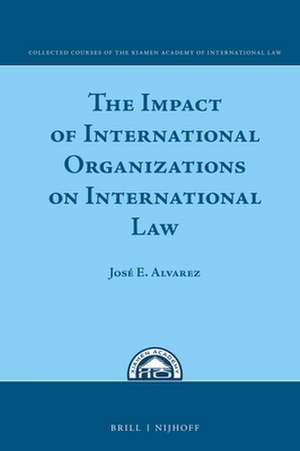The Impact of International Organizations on International Law: Collected Courses of the Xiamen Academy of International Law, cartea 7
Autor José E. Alvarezen Limba Engleză Hardback – 30 noi 2016
"A masterfully crafted piece of scholarship that engages with the very raison d’être of international organizations. Written by one of the leading authorities in the field, this book provides an insightful, perspicacious and to-the-point analysis of the impact of international organizations in today’s international legal order while also shedding light on their weaknesses. A must read for all those whose work touches upon the law of international organization." ~Laurence Boisson de Chazournes, University of Geneva
"The role of Public International Law, rooted largely in decisions of or relating to international institutions, has been steadily, quietly re-shaping international economic relations and other links between states and regions for decades. There is no greater authority on international organizations within the American law community than Professor José Alvarez. This volume illuminates these trends as well as their limitations and vulnerabilities. It delivers a first-rate, incisive primer on the field." ~David M. Malone, Under-Secretary-General of the United Nations, Rector of the UN University
Preț: 878.52 lei
Preț vechi: 1071.37 lei
-18% Nou
Puncte Express: 1318
Preț estimativ în valută:
168.11€ • 179.76$ • 140.16£
168.11€ • 179.76$ • 140.16£
Carte indisponibilă temporar
Doresc să fiu notificat când acest titlu va fi disponibil:
Se trimite...
Preluare comenzi: 021 569.72.76
Specificații
ISBN-13: 9789004328396
ISBN-10: 9004328394
Dimensiuni: 155 x 235 mm
Greutate: 0.82 kg
Editura: Brill
Colecția Brill | Nijhoff
Seria Collected Courses of the Xiamen Academy of International Law
ISBN-10: 9004328394
Dimensiuni: 155 x 235 mm
Greutate: 0.82 kg
Editura: Brill
Colecția Brill | Nijhoff
Seria Collected Courses of the Xiamen Academy of International Law
Cuprins
I.Legal Positivism and its Discontents
(1)The Mainstream: Legal Positivism
(a)Positivist Treaties
(b)Positivist Custom
(c) Positivist General Principles
(2)The Institutional Challenge to Legal Positivism
(a)The Reality of Institutionalization
(b)The International Judiciary
(c)The Return of Domestic Analogies
(d)From State Rules to Process
(e)From Process to Inter-disciplinarity
(3)Caveats
II.The UN Charter Over Time: The Contemporary Security Council
(1)What is the UN Charter for?
(2)The UN Charter as Positivist Instrument
(3)The Council and the “Contracting Out” of Force: Iraq
(4)The Council as Extradition Tool
(5)The Council and Ad Hoc War Criminal Tribunals
(6)The Council and the “Right to Democracy”
(7)The Council’s “Smart” Sanctions
(8)The Council’s Global “Legislation”
(9)The Council’s New Tool: The ICC
(10) The Council and “Human Security”
III.The Contemporary General Assembly
(1)The Assembly and the Sources of International Law
(2) The Assembly as Charter Interpreter
(3) The Assembly as Human Rights Interpreter and Enforcer
(4) The Assembly as Peace and Security Institutional Actor
IV. A Contemporary Specialized Agency: The World Health Organization
(1) The Origins of the WHO
(2) The Fall of the Old IHRs
(3)The Rise of the Revised (2005) IHRs
(4) The WHO’s First Treaty: The Framework Convention on Tobacco Control
(5) The WHO in Larger Context
V. The Main Functions of International Adjudication
(1) Introduction
(2) The Complex Dispute Settlement Function
(3) The Fact-Finding Function
(4) The Law-Making Function
(5) The Governance Function
(6) Conclusions
VI. Three Challenges Posed by International Organizations
(1)The IO Challenge to Legal Positivism
(a)The challenge to the primacy of states and state consent
(b)The challenge to the Article 38 source of international obligation
(c)The challenge to bindingness
(d)Explaining how IO charters “evolve”
(2)The IO Challenge to Sovereignty
(3)The IO Challenge to the Rule of Law
(4)Conclusion
(1)The Mainstream: Legal Positivism
(a)Positivist Treaties
(b)Positivist Custom
(c) Positivist General Principles
(2)The Institutional Challenge to Legal Positivism
(a)The Reality of Institutionalization
(b)The International Judiciary
(c)The Return of Domestic Analogies
(d)From State Rules to Process
(e)From Process to Inter-disciplinarity
(3)Caveats
II.The UN Charter Over Time: The Contemporary Security Council
(1)What is the UN Charter for?
(2)The UN Charter as Positivist Instrument
(3)The Council and the “Contracting Out” of Force: Iraq
(4)The Council as Extradition Tool
(5)The Council and Ad Hoc War Criminal Tribunals
(6)The Council and the “Right to Democracy”
(7)The Council’s “Smart” Sanctions
(8)The Council’s Global “Legislation”
(9)The Council’s New Tool: The ICC
(10) The Council and “Human Security”
III.The Contemporary General Assembly
(1)The Assembly and the Sources of International Law
(2) The Assembly as Charter Interpreter
(3) The Assembly as Human Rights Interpreter and Enforcer
(4) The Assembly as Peace and Security Institutional Actor
IV. A Contemporary Specialized Agency: The World Health Organization
(1) The Origins of the WHO
(2) The Fall of the Old IHRs
(3)The Rise of the Revised (2005) IHRs
(4) The WHO’s First Treaty: The Framework Convention on Tobacco Control
(5) The WHO in Larger Context
V. The Main Functions of International Adjudication
(1) Introduction
(2) The Complex Dispute Settlement Function
(3) The Fact-Finding Function
(4) The Law-Making Function
(5) The Governance Function
(6) Conclusions
VI. Three Challenges Posed by International Organizations
(1)The IO Challenge to Legal Positivism
(a)The challenge to the primacy of states and state consent
(b)The challenge to the Article 38 source of international obligation
(c)The challenge to bindingness
(d)Explaining how IO charters “evolve”
(2)The IO Challenge to Sovereignty
(3)The IO Challenge to the Rule of Law
(4)Conclusion
Notă biografică
José E. Alvarez is the Herbert and Rose Rubin Professor of International Law at New York University Law School. He served as President of the American Society of International Law (ASIL) from 2006-2008 and is currently the co-editor in chief of the American Journal of International Law.








